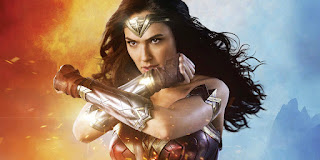Sometimes, I think modern women forget how far we've really come in the last century. In 1900, women were not allowed to vote and while we were allowed to keep pre-marital property, any wages or income post-marriage belonged to our husbands, and we were considered "persons" under the law for penalties but not for rights or privileges. The Victorian ideal of a woman, devoted to children, home and husband, stayed strong. An ideal woman was artfully weak and helpless, deferred to others (or stayed silent and invisible entirely), and the best possible compliment was that everything she managed ran smoothly without anyone seeing her make an effort or even realizing she was there.
In October 1941, Wonder Woman burst through the pulp pages of comic books to become a female icon. She wasn't demure. She was not deferential. She did not rely on men to do things for her. She was an Amazon (and for many, this was the first time that they would hear of the ancient Greek legends of female warriors) and was declared a Goddess of Love and War.
Wonder Woman was the first female superhero and is the one with the longest run. She was created by Charles Moulton, who was an early pioneer in inventing the lie detector (under his real name of William Moulton Marston). He and his wife and their lover created Wonder Woman as a foil for the male superheroes of DC comics. They wanted a hero who would conquer with love instead of by punching. They wanted her to be a female role model for girls. In 1943, Marston wrote: "Not even girls want to be girls so long as our feminine archetype lacks force, strength, and power... The obvious remedy is to create a feminine character with all the strength of Superman plus all the allure of a good and beautiful woman."
Now, Marston also had some not-entirely-compatible ideas of female empowerment through submission and a bit of an alleged fetish with bondage, but that doesn't diminish the power of what he and his partners created. For the first time, the female character wasn't a girlfriend, secretary or victim. She was one of the powerful, one of the good guys.
But she wasn't effectively a male superhero with odd bumps. She was a different kind of hero, one who loved children and animals, who could nurture as well as kick butt. These two things weren't seen as mutually exclusive traits, they were both sides of her personality and neither negated the other. She lived up to both interpretations of her name: she was a "wonder" in being a woman who was as strong (or stronger) than Superman and she was a woman who embraced the "wonder" of the world around her, able to enjoy it rather than brooding or hiding.
Granted, she wasn't always properly written. When she joined DC's Justice League, she often found herself in the hands of writers who couldn't figure out what to do with her, so she got coffee or did the filing while Batman, Superman, the Flash and the Green Lantern went out to battle evil. But in the right hands, she became something unique and valuable: a woman who grew up without society and culture telling her to be less.
Wonder Woman grew up in Themiscyra, a mystical island populated solely by women and cut off from the outside world. Thus it never occurred to her that there was a job that women couldn't do. Women do it all in her world and are never told that they are over-reaching, being unfeminine, or dismissed and cursed. She was never cautioned not to do something because boys might get the wrong impression. She was never told not to get her clothes dirty or to worry about wrecking her hair. She was never told that people don't like smart women or strong women.
She is what all women could be, if they were given the same confidence as men.
That is an incredibly appealing concept to me. Most modern female superheroes are dark and brooding. They kick butt, but they don't talk about their feelings or have healthy relationships. I love them and enjoy writing them, but I can also appreciate Wonder Woman as an alternative. She is kind and optimistic without being silly or stupid. And without giving up any of her power. She has faith in the world, not because the world deserves it, but because she has confidence that she can deal with any failures or problems. That's something I would like to explore more fully and I already have story ideas starting to take root.
I'm glad that the recent movie has breathed new life into Wonder Woman and introduced her to a new generation. She take her place among the many different role models for girls, showing that they can be strong, powerful and uncompromising without losing wonder, joy and love.
Are you addicted to strong and intriguing heroines like I am? You can sign up to get each month's Heroine Fix by email and then you'll never miss your next Heroine Fix.
Next month, I'm going to do one of my all-time favourites: Willow from Buffy the Vampire Slayer. Her transformation from nerd to witch to goddess is definitely worthy of celebration.







No comments:
Post a Comment